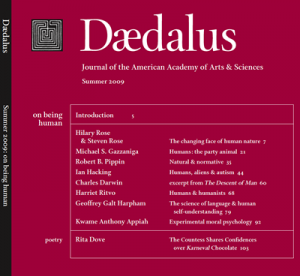Dædalus
For the summer 2009 issue of Dædalus, the National Humanities Center and the American Academy of Arts & Sciences partnered to produce a collection of essays dedicated to the scholarly topic on which this website is premised: our deepening understanding of the meaning and significance of being human. As the Introduction to the summer issue notes:
In 2006, the National Humanities Center launched a three-year study of how advances in science are enlarging the terms through which human life is discussed, and continuing to disturb traditional understandings of what it means to be human. The essays gathered here constitute a sampling of the scholarship inspired by the Center’s effort.
Click any of the following links to download a section of the journal (in pdf format), and read more about the authors below.
Hilary Rose and Steven Rose, The changing face of human nature
Michael S. Gazzaniga, Humans: the party animal
Robert B. Pippin, Natural & normative
Ian Hacking, Humans, aliens & autism
Charles Darwin, Comparison of the Mental Powers of Man and the Lower Animals–continued
Harriet Ritvo, Humans & humanists
Geoffrey Galt Harpham, How do we know what we are? The science of language & human self-understanding
Kwame Anthony Appiah, Experimental moral psychology
Kwame Anthony Appiah, a Fellow of the American Academy since 1995, is the Laurance S. Rockefeller University Professor of Philosophy and the University Center for Human Values at Princeton University. His recent publications include Experiments in Ethics (2008), Cosmopolitanism: Ethics in a World of Strangers (2006), The Ethics of Identity (2005), and Thinking It Through: An Introduction to Contemporary Philosophy (2003).
Michael S. Gazzaniga, a Fellow of the American Academy since 1997, is professor of psychology and director of the sage Center for the Study of Mind at the University of California, Santa Barbara. His publications include Human: The Science Behind What Makes Us Unique (2008), The Mind’s Past (1998), and Mind Matters: How Mind and Brain Interact to Create Our Conscious Lives (1988).
Ian Hacking, a Fellow of the American Academy since 1991, is Professeur honoraire (emeritus) at the Colle`ge de France in Paris and University Professor Emeritus at the University of Toronto. His books include Historical Ontology (2002), The Social Construction of What? (1999), and The Taming of Chance (1990), which the Modern Library named one of the 100 Best Nonfiction Books published in English in the twentieth century.
Geoffrey Galt Harpham has been president and director of the National Humanities Center since 2003. He has held teaching appointments at the University of Pennsylvania, Brandeis University, and Tulane University, where he was the Pierce Butler Professor of English. His recent publications include Shadows of Ethics: Criticism and the Just Society (1999), Language Alone: The Critical Fetish of Modernity (2002), and The Character of Criticism (2006).
Robert B. Pippin, a Fellow of the American Academy since 2007, is the Evelyn Stefansson Nef Distinguished Service Professor in the Committee on Social Thought, the department of philosophy, and the College at the University of Chicago. His recent books include Hegel’s Practical Philosophy: Rational Agency as Ethical Life (2008), The Persistence of Subjectivity: On the Kantian Aftermath (2005), and Henry James and Modern Moral Life (2000).
Harriet Ritvo, a Fellow of the American Academy since 2005, is the Arthur J. Conner Professor of History at the Massachusetts Institute of Technology. She is the author of The Platypus and the Mermaid, and Other Figments of the Classifying Imagination (1997), The Animal Estate: The English and Other Creatures in the Victorian Age (1987), and The Dawn of Green: Manchester, Thirlmere, and Modern Environmentalism (2009). She coedited Macropolitics of Nineteenth-Century Literature: Nationalism, Exoticism, Imperialism (with Jonathan Arac, 1991).
Hilary Rose is professor of social policy emerita at the University of Bradford, United Kingdom. Her books include Love, Power, and Knowledge: Towards a Feminist Transformation of the Sciences (1994) and Science and Society (with Steven Rose, 1969). She has coedited five books with Steven Rose, including Ideology of/in the Natural Sciences (1980).
Steven Rose is professor emeritus in the department of life sciences at the Open University, United Kingdom. His books include Lifelines: Biology beyond Determinism (1998) and The Making of Memory (1992). He has coedited five books with Hilary Rose, including The Political Economy of Science: Ideology of/in the Natural Sciences (1976).
